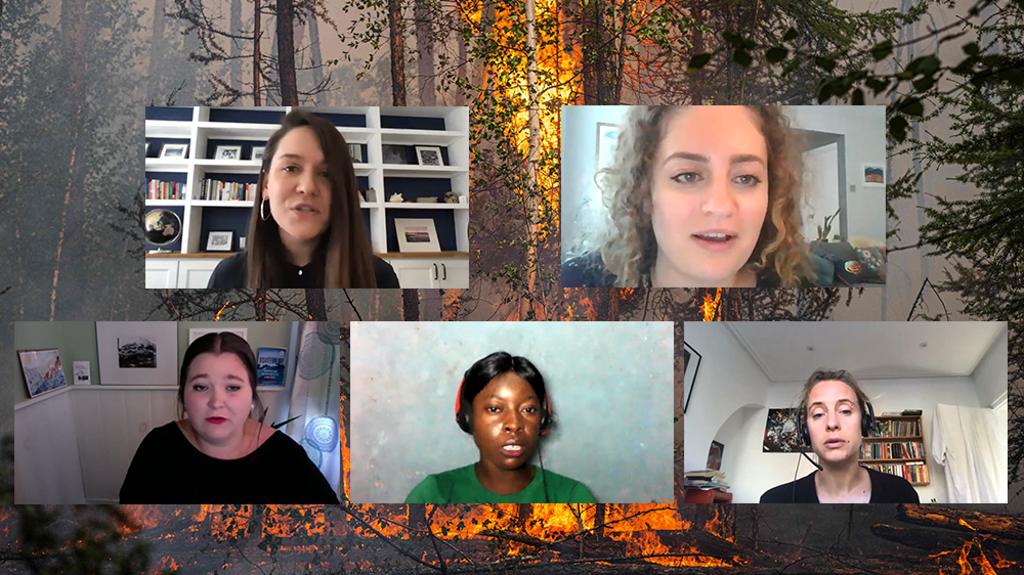Watch experts discuss climate crisis’s impact on extreme weather during The Independent’s exclusive event

“Virtually impossible without it.”
That was how Dr Friederike Otto, associate director of the Environmental Change Institute at Oxford University described her recent analysis into the link between North America’s deadly heatwave and the climate crisis, in the latest virtual climate event hosted byThe Independent.
Climate change is not making all types of extreme weather events, everywhere in the world more likely, Dr Otto cautioned.
But she said: “What we do see globally is a very, very strong increase in the likelihood of heatwaves to occur. Everywhere, heatwaves are becoming tens, hundreds, or even thousands of times more likely and are also getting more intense.
“The changes in other types of extreme events are smaller but we also see increases in the likelihood and intensity of extreme precipitation. And especially in already dry regions, we see an increase in drought.”
The event, held on 28 July, came at a moment when people are witnessing more extreme weather events, no matter which continent they live on. Hundreds have died in deadly heatwaves, from the US and Canada to India, along with Iraq and the rest of the Middle East.
Sign up to The Independent’s free weekly climate newsletter by clicking here
Flooding has devastated regions of Nigeria, India, China, Germany, Belgium and the UK while wildfires have exploded across the Brazilian Amazon, Siberia, parts of southern Europe and the American West.
The Independent invited Dr Otto, along with Oladosu Adenike, a climate activist based in Nigeria, and Dr Samantha Montano, assistant professor of emergency management at Massachusetts Maritime Academy and author of the new book, Disasterology: Dispatches From The Frontline of The Climate Crisis, to discuss how the climate crisis is supercharging extreme weather events.
Dr Montano shared her experiences of being on the ground at disasters including 2005’s Hurricane Katrina which devastated New Orleans. She underlined how vulnerable communities are impacted first, and how it can take many years to recover.
Watch the full event in the video below
“It isn't just the week or two after the hurricane makes landfall, the disaster continues much longer,” she said. “There are still people in New Orleans, over 15 years later, who were not able to rebuild, haven't returned to the city, who are still struggling to find the resources to do that.
“We also need to think [about how] that is happening in the United States, a wealthy country that has the resources to help people rebuild and recover if they were used effectively.”
She added: “Even within countries, we see disparity. Disasters are not great equalizers as is sometimes said. In fact, they are not only the product of inequality but perpetuate those inequalities so low-income communities, people of color, people with many types of disabilities, people who are elderly, children, people who are homeless. These are the individuals that tend to take on a disproportionate impact from these events, and tend to have the hardest time trying to navigate aid systems in the aftermath.”
Ms Adenike spoke of what she is witnessing in her home country and then reflected more widely on what is happening across sub-Saharan Africa. She noted the recent devastating flooding in Nigeria and how “we haven’t even started the rainy season yet”.
The audience learned of knock-on impacts that climate-driven weather events can cause. The activist spoke of the climate-driven famine in Madagascar but also how impacts can drive tension in local communities, for example, increasing conflict between farmers and herdsman over dwindling natural resources.
To find out what others are saying and join the conversation scroll down for the comments section or click here for our most commented on articles
The climate activist said that the media has an important role to play in helping to bridge the gap and provide more information on the climate crisis.
“Africa gets little media attention,” she noted. “And this is disproportionately affecting us.”
Wherever disasters strike in the world, the experts warned that most countries are not doing enough to adapt.
And ahead of the UN’s international climate talks, COP26, being held in the UK this November, Ms Adenike said that individuals and activists have a role to play in pressuring global leaders to take swifter action.
“Governments making these promises for 2030 or 2050, I do ask this question - will you be there, will your leadership extend to this time?”
She added: “[Governments] have to make policies within your leadership framework. That’s where it brings progress.”
Read More
How climate crisis is already impacting ‘not prepared’ UK, according to Met Office
Cop26: China, India and Russia must ‘do more’ to tackle climate crisis, says Alok Sharma

 Yahoo News
Yahoo News 
